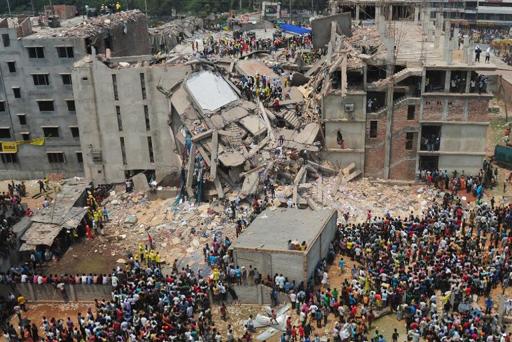Safety experts hired by Western retailers such as H&M and Benetton will begin a mass inspection Wednesday of clothing factories in Bangladesh, nearly a year after 1,135 garment workers died in a building collapse.
Dozens of fire officers and structural engineers will begin inspecting more than 1,500 plants and then recommend safety improvements in an exercise that is expected to last until September.
Bangladesh is the world's second biggest clothing manufacturer and the sector is the mainstay of the impoverished South Asian nation's economy.
But the sector has a woeful safety track record, which was highlighted in November 2012 by a fire at the Tazreen factory in Dhaka when 111 workers were killed, many of whom were unable to escape due to a lack of proper fire exits.
Less than six months later, 1,135 people were killed when the nine-storey Rana Plaza complex collapsed on the outskirts of the capital in Bangladesh's deadliest industrial disaster.
Experts say the complex -- which was only licenced for four storeys -- crumbled as it had been constructed with sub-standard materials and without proper surveys of the site.
Bosses had also set up huge generators on the ceiling, which triggered the collapse when they all automatically clicked on following a power cut.
Spanish fashion chain Mango, Britain's Primark, Italy's Benetton, Sweden's H&M and the sports brand Adidas were among the host of big Western brands to sign up to an accord in the aftermath of the disaster in which they agreed to bankroll the safety inspections and loan the money for upgrades.
"All four engineering teams are here," said Rob Wayss, one of the managers overseeing the inspections.
"They will start factory inspection from Wednesday and complete their job by September this year," he told AFP.
The brands signed the legally-binding accord several weeks after the April 24 disaster, following widespread accusations that they had been turning a blind eye to shoddy safety standards in a country where textile workers had been paid as little as 38 dollars a month.
- Picking up the bill -
That basic wage has since risen by 77 percent and garment bosses worry that they will lose their competitive edge if they now have to pick up the tab as well for extensive safety improvements.
Few factories, some of which employ tens of thousands of people, have even the most basic safety equipment such as sprinklers or fire escapes on every floor.
The latest inspection drive is the biggest ever undertaken by any government, international agency or retailer, according to Wayss.
However, observers say the biggest obstacle to improving standards is the lack of enforcement by officials who are often prepared to sign safety certificates for cash.
Some major US retailers, including Walmart, held back from signing the accord in May but they have drawn up their own separate agreement to inspect several hundred factories with their own experts.
Wayss said the engineers would identify safety problems in the factories, draw up recommendations to improve safety and set a deadline for the owners to implement the necessary measures.
"The timeline will depend on the nature of the safety problems," he said, adding the retailers would loans their contract manufacturers the money needed to carry out the upgrades if they could not immediately afford the work themselves.
Despite the promises of a loan, some bosses are unhappy at having to carry out what they describe as "unnecessary and costly" improvements.
The Bangladesh Garment Manufacturers and Exporters Association says the industry needs more time, especially if they have to shift factories out of buildings which were constructed mainly for residential purposes.
"Sprinklers, fire-proof doors and new electric wires raise cost of production to the extent that some factories won't be able to operate anymore," said the association's vice-president Shahidullah Azim.
Wayss however ruled out any suggestion of a compromise on safety issues, saying that all factories would have to install sprinklers and fire doors.
Bangladesh is the world's biggest clothing exporter after China and has around 4,500 garment factories. The industry generates around $22 billion, making it by far the biggest earner for the government.






















































